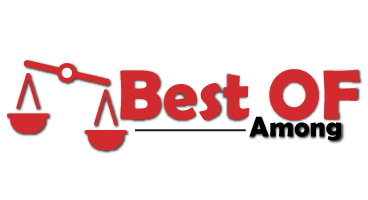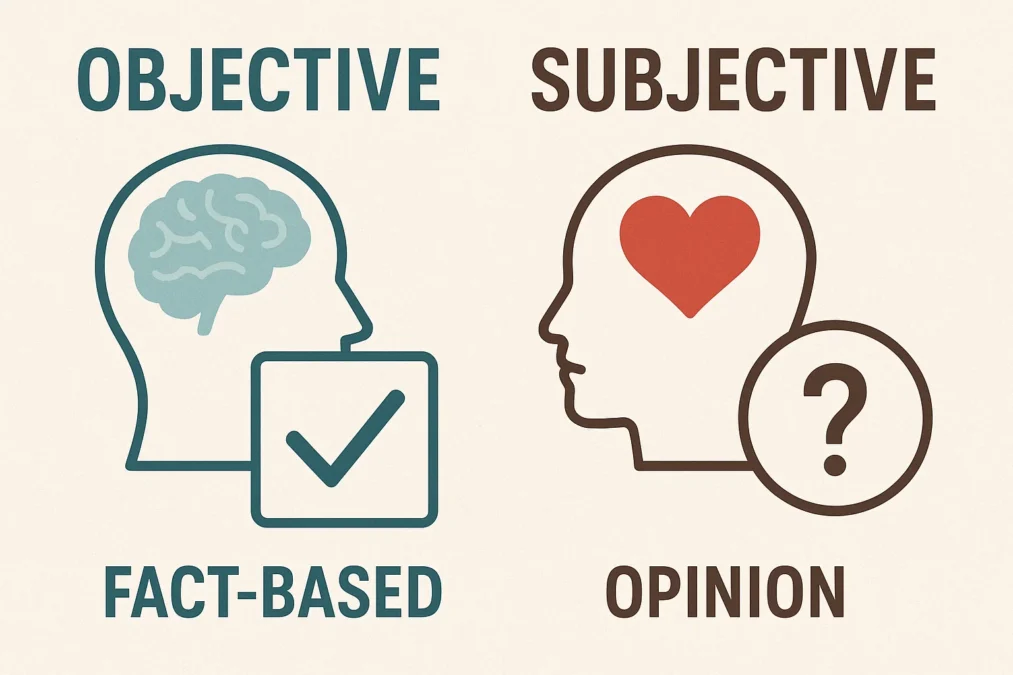Objective vs Subjective: In the realm of philosophy, science, and everyday life, the terms “objective” and “subjective” are frequently used to describe different types of information, perspectives, and truths. Understanding the distinction between these two concepts is crucial for critical thinking, decision-making, and effective communication. This article delves into the objective vs subjective meaning, their definitions, key differences, and real-world applications. By the end, you’ll have a clear understanding of how these concepts shape our perception of reality.
What is Objective?
Objective refers to information, statements, or observations that are based on facts and are free from personal biases, emotions, or interpretations. Objective data is verifiable, measurable, and consistent, regardless of who is observing or analyzing it. For example, the statement “Water boils at 100°C at sea level” is objective because it is a scientific fact that can be tested and proven.
Characteristics of Objective Information
- Fact-Based: Objective statements rely on empirical evidence and data.
- Unbiased: They are not influenced by personal feelings or opinions.
- Verifiable: Objective claims can be tested and confirmed by others.
- Universal: They hold true across different contexts and perspectives.
For instance, in scientific research, objectivity is paramount. Scientists strive to eliminate personal biases to ensure their findings are accurate and reproducible. Similarly, in journalism, objective reporting aims to present facts without editorializing or injecting personal opinions.
Examples of Objective Statements
- “The Earth revolves around the Sun.”
- “The human body has 206 bones.”
- “The capital of France is Paris.”
These statements are objective because they are grounded in factual, verifiable information.
What is Subjective?
Subjective refers to information, statements, or observations that are influenced by personal feelings, opinions, or interpretations. Subjective data is inherently personal and can vary from one individual to another. For example, the statement “Chocolate ice cream is the best dessert” is subjective because it reflects a personal preference that others may not share.
Characteristics of Subjective Information
- Opinion-Based: Subjective statements are rooted in personal beliefs or experiences.
- Biased: They are influenced by emotions, preferences, or cultural background.
- Non-Verifiable: Subjective claims cannot be universally proven or disproven.
- Context-Dependent: They vary depending on the individual’s perspective.
Subjective information is prevalent in art, literature, and personal narratives. For example, a movie review is subjective because it reflects the reviewer’s personal taste and interpretation of the film.
Examples of Subjective Statements
- “The movie was boring.”
- “Pineapple on pizza is delicious.”
- “Winter is the most beautiful season.”
These statements are subjective because they are based on personal opinions and cannot be universally validated.
Objective vs Subjective: Key Differences
To better understand the objective vs subjective definition, let’s explore their key differences in a structured manner.
| Aspect | Objective | Subjective |
|---|---|---|
| Basis | Facts, evidence, and data | Personal opinions, feelings, and interpretations |
| Verifiability | Can be tested and proven | Cannot be universally verified |
| Bias | Free from personal bias | Influenced by personal bias |
| Consistency | Consistent across observers | Varies from person to person |
| Examples | Scientific facts, historical events | Art critiques, personal preferences |
Real-World Applications
- Science and Research: Objectivity is crucial in scientific experiments to ensure accurate and reliable results.
- Journalism: Objective reporting provides unbiased news, while subjective editorials offer personal perspectives.
- Art and Literature: Subjectivity allows for creative expression and diverse interpretations.
- Decision-Making: Objective data supports informed decisions, while subjective insights add a human touch.
Objective vs Subjective in Philosophy
The objective vs subjective debate has deep roots in philosophy, particularly in epistemology (the study of knowledge) and metaphysics (the study of reality). Philosophers have long grappled with questions like:
- What is real?
- How do we know what we know?
- Can we separate our perceptions from reality?
Historical Perspectives
- Plato: Argued that objective truths exist in the realm of ideas, independent of human perception.
- Descartes: Emphasized the role of subjectivity in human consciousness with his famous statement, “I think, therefore I am.”
- Kant: Proposed that while objective reality exists, our understanding of it is shaped by subjective mental structures.
Modern Interpretations
In contemporary philosophy, the line between objectivity and subjectivity is often blurred. For example, in quantum mechanics, the observer’s role can influence the outcome of an experiment, challenging the notion of pure objectivity.
Objective vs Subjective in Everyday Life
Understanding the difference between objective and subjective is essential for navigating everyday situations. Here are some examples:
In Relationships
- Objective: “We have been together for five years.”
- Subjective: “Our relationship is the most fulfilling one I’ve ever had.”
In the Workplace
- Objective: “The project was completed on time and within budget.”
- Subjective: “I feel that the team could have communicated better.”
In Education
- Objective: “The student scored 95% on the math test.”
- Subjective: “The student has a natural talent for mathematics.”
FAQs: Objective vs Subjective
1. What is the difference between objective and subjective data?
Objective data is factual and measurable, while subjective data is based on personal opinions and interpretations.
2. Can something be both objective and subjective?
Yes, in some cases. For example, a historical event is objective, but its interpretation can be subjective.
3. Why is objectivity important in science?
Objectivity ensures that scientific findings are accurate, reliable, and free from personal biases.
4. How can I identify subjective statements?
Look for language that reflects personal opinions, emotions, or preferences, such as “I think,” “I feel,” or “in my opinion.”
5. Is subjectivity always a bad thing?
No, subjectivity is valuable in areas like art, literature, and personal relationships, where individual perspectives matter.
Conclusion
The distinction between objective vs subjective is fundamental to how we perceive and interact with the world. While objective information provides a factual foundation, subjective perspectives add depth and diversity to our understanding. By recognizing the differences between these two concepts, we can make more informed decisions, communicate more effectively, and appreciate the richness of human experience.
Undergraduate vs Graduate: Understanding the Key Differences
By understanding the nuances of objective vs subjective, you can navigate complex ideas with clarity and confidence. Whether you’re analyzing data, engaging in debates, or simply reflecting on your experiences, this knowledge will serve as a valuable tool.



